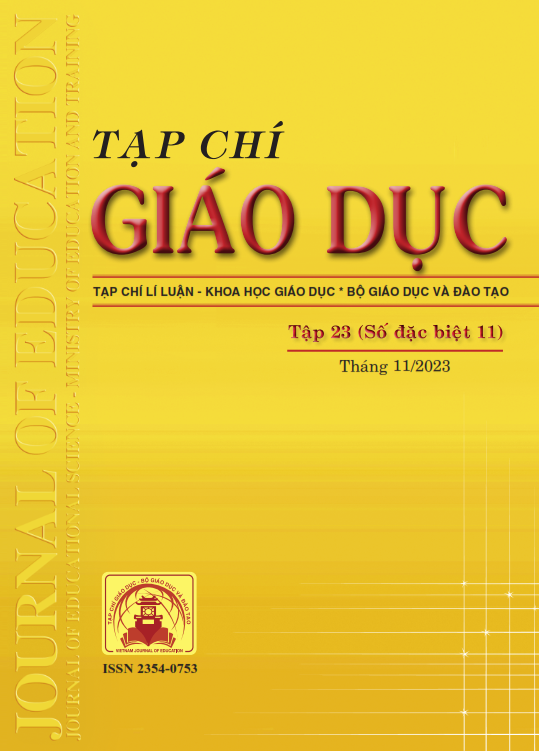Công nghệ 4.0 trong môi trường học tập thông minh tại Việt Nam
Tóm tắt
The development of 4.0 technology allows learners to learn more effectively, flexibly, and comfortably. Learners use smart devices to access digital resources wirelessly and immerse themselves in personalized and seamless learning. Innovative education, a concept that describes the learning process in the digital era, is becoming increasingly important. The article's goal is 4.0 technology used to design intelligent educational systems. These 4.0 technologies make education bright, institutional, and popular. In the context of Vietnamese education, 4.0 technology helps promote the development of intelligent learning environments, helping to increase efficiency and improve education quality. Universities and training institutions must adapt to new technology to provide a more modern and practical education. Technology 4.0 plays a vital role in improving the quality of teaching and learning, creating a reliable and exciting learning environment for Vietnamese students.
Tài liệu tham khảo
Casalino, G., Grilli, L., Limone. P., Santoro D., & Schicchi, D. (2021) Deep learning for knowledge tracing in learning analytics: an overview. In: Proceedings of the third workshop of technology-enhanced learning environments for blended education - the Italian e-Learning conference, 2817, 1-10. CEUR-WS.
Deeva, M., & Finogeev, W. (2023) Application of the concurrent education model in the development of an intelligent learning environment. Telematics and Informatics Reports. https://doi.org/10.1016/j.teler.2023.100051
Ilić, M., Mikić, V., Kopanja, L., & Vesin, B. (2023). Intelligent techniques in e‑learning: a literature review. Artificial Intelligence Review, 56, 14907-14953. https://doi.org/10.1007/s10462-023-10508-1
Kim, T., Cho, J. Y., & Lee, B. G. (2013). Evolution to smart learning in public education: a case study of Korean public education. In Open and Social Technologies for Networked Learning: IFIP WG 3.4 International Conference, OST 2012, Tallinn, Estonia, July 30-August 3, 2012, Revised Selected Papers (pp. 170-178). Springer Berlin Heidelberg.
Li, K. C., & Wong, B. T. M. (2021). Review of smart learning: Patterns and trends in research and practice. Australasian Journal of Educational Technology, 37(2), 189-204. https://doi.org/10.14742/ajet.6617
Liu, Y., Hwang,W., & Su, C. (2022). Investigating the impact of context-awareness intelligent learning mechanism on EFL conversation learning. Taylor & Francis Online. https://doi.org/10.1080/10494820.2023.2194931
Mulyadi, D., Huda, M., & Gusmian, L. (2022). Smart Learning Environment (SLE) in the Fourth Industrial Revolution (IR 4.0). International Journal of Asian Business and Information Management, 13(2). https://doi.org/10.4018/ijabim.287589
Middleton, A. (2015). Smart Learning - Teaching and learning with smartphones and tablets in postcompulsory education. UK: MELSIG.
Nguyễn Văn Bình (2017). Việt Nam với cuộc cách mạng công nghiệp lần thứ tư. NXB Đại học Kinh tế Quốc dân.
Şahin, M., & Yurdugül, H. (2019). An intervention engine design and development based on learning analytics: The intelligent intervention system (In2S). Smart Learning Environments, 6, Article 18. https://doi.org/10.1186/s40561-019-0100-7
Shenkoya, T., & Kim, E. (2023) Sustainability in Higher Education: Digital Transformation of the Fourth Industrial Revolution and Its Impact on Open Knowledge. Sustainability, 15(3), 2473. https://doi.org/10.3390/su15032473
Tzenios, N. (2022). Learner-centered teaching. International Research Journal of Modernization in Engineering Technology and Science. https://www.doi.org/10.56726/IRJMETS32262
Wong, B. T. M., Li, K. C., & Choi, S. P. M. (2018). Trends in learning analytics practices: A review of Higher education institutions. Interactive Technology and Smart Education, 15(2), 132-154. https://doi.org/10.1108/ITSE-12-2017-0065
Shu, X., & Gu, X. (2023). An Empirical Study of A Smart Education. Model Enabled by the Edu-Metaverse to Enhance Better Learning Outcomes for Students. Systems, 11(2), 75. https://doi.org/10.3390/systems11020075
Shi, Y., Peng, F., & Sun, F. (2022). A Blended Learning Model Based on Smart Learning Environment to Improve College Students’ Information Literacy. IEEE Access, 10, 89485-89498. https://doi.org/10.1109/access.2022.3201105
Đã Xuất bản
Cách trích dẫn
Số
Chuyên mục
Giấy phép

Tác phẩm này được cấp phép theo Ghi nhận tác giả của Creative Commons Giấy phép quốc tế 4.0 .












